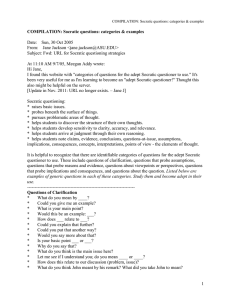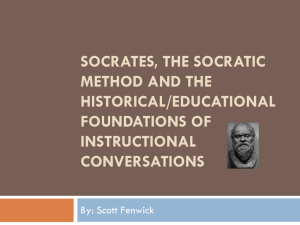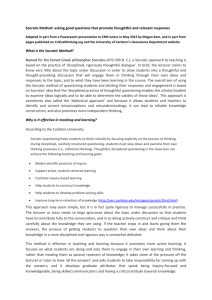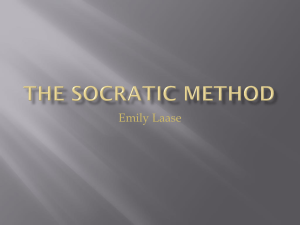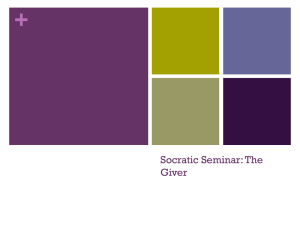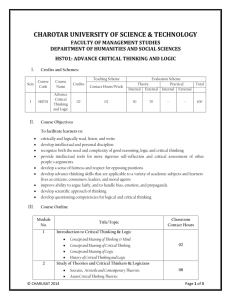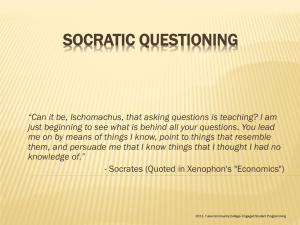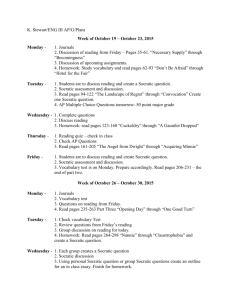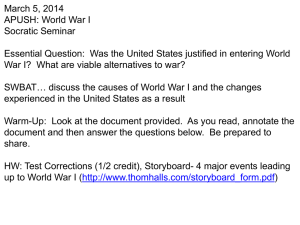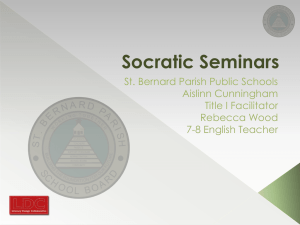Socratic Questioning Strategies
advertisement
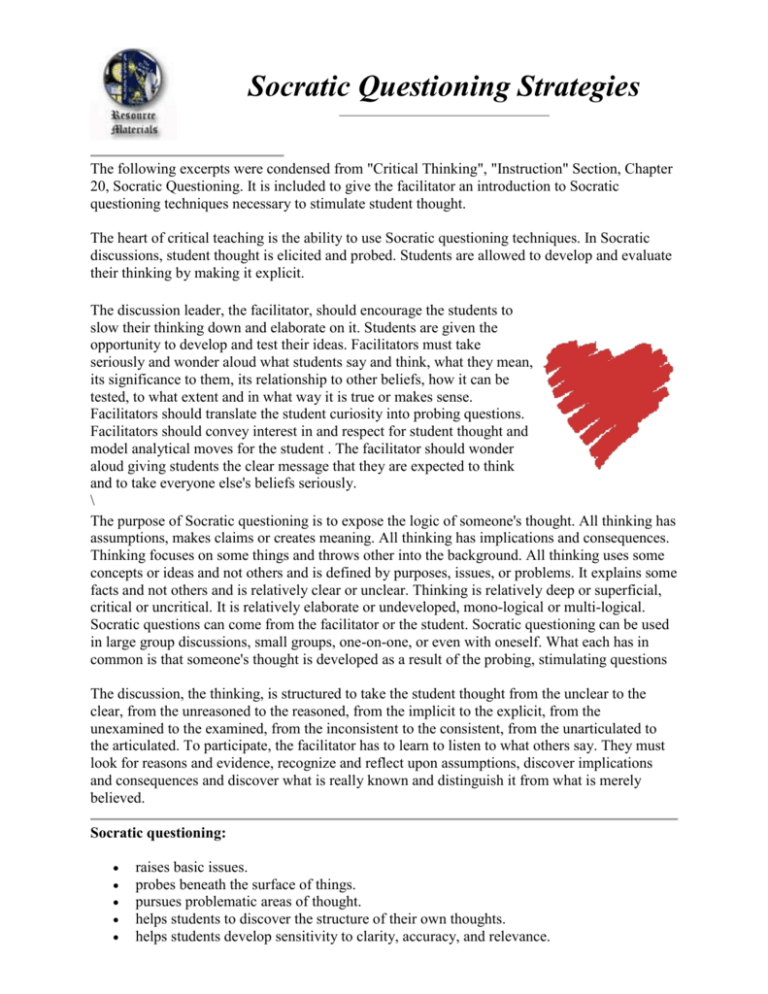
Socratic Questioning Strategies The following excerpts were condensed from "Critical Thinking", "Instruction" Section, Chapter 20, Socratic Questioning. It is included to give the facilitator an introduction to Socratic questioning techniques necessary to stimulate student thought. The heart of critical teaching is the ability to use Socratic questioning techniques. In Socratic discussions, student thought is elicited and probed. Students are allowed to develop and evaluate their thinking by making it explicit. The discussion leader, the facilitator, should encourage the students to slow their thinking down and elaborate on it. Students are given the opportunity to develop and test their ideas. Facilitators must take seriously and wonder aloud what students say and think, what they mean, its significance to them, its relationship to other beliefs, how it can be tested, to what extent and in what way it is true or makes sense. Facilitators should translate the student curiosity into probing questions. Facilitators should convey interest in and respect for student thought and model analytical moves for the student . The facilitator should wonder aloud giving students the clear message that they are expected to think and to take everyone else's beliefs seriously. \ The purpose of Socratic questioning is to expose the logic of someone's thought. All thinking has assumptions, makes claims or creates meaning. All thinking has implications and consequences. Thinking focuses on some things and throws other into the background. All thinking uses some concepts or ideas and not others and is defined by purposes, issues, or problems. It explains some facts and not others and is relatively clear or unclear. Thinking is relatively deep or superficial, critical or uncritical. It is relatively elaborate or undeveloped, mono-logical or multi-logical. Socratic questions can come from the facilitator or the student. Socratic questioning can be used in large group discussions, small groups, one-on-one, or even with oneself. What each has in common is that someone's thought is developed as a result of the probing, stimulating questions The discussion, the thinking, is structured to take the student thought from the unclear to the clear, from the unreasoned to the reasoned, from the implicit to the explicit, from the unexamined to the examined, from the inconsistent to the consistent, from the unarticulated to the articulated. To participate, the facilitator has to learn to listen to what others say. They must look for reasons and evidence, recognize and reflect upon assumptions, discover implications and consequences and discover what is really known and distinguish it from what is merely believed. Socratic questioning: raises basic issues. probes beneath the surface of things. pursues problematic areas of thought. helps students to discover the structure of their own thoughts. helps students develop sensitivity to clarity, accuracy, and relevance. helps students arrive at judgment through their own reasoning. helps students note claims, evidence, conclusions, questions-at-issue, assumptions, implications, consequences, concepts, interpretations, points of view - the elements of thought. It is helpful to recognize that there are identifiable categories of questions for the adept Socratic questioner to use. These include questions of clarification, questions that probe assumptions, questions that probe reasons and evidence, questions about viewpoints or perspectives, questions that probe implications and consequences, and questions about the question. Listed below are examples of generic questions in each of these categories. Study them and become adept in their use. Questions of Clarification What do you mean by ____? Could you give me an example? What is your main point? Would this be an example: ___? How does ___ relate to ___? Could you explain that further? Could you put that another way? Would you say more about that? Is your basic point ___ or ___? Why do you say that? What do you think is the main issue here? Let me see if I understand you; do you mean ____ or ____? How does this relate to our discussion (problem, issue)? What do you think John meant by his remark? What did you take John to mean? Jane, would you summarize in your own words what Richard has said? ... Richard, is that what you meant? Questions that Probe Assumptions What are you assuming? What is Karen assuming? What could we assume instead? You seem to be assuming ___. Do I understand you correctly? All of your reasoning depends on the idea that ___? Why have you based your reasoning on ___ rather than ___? Your seem to be assuming ___. How would you justify taking this for granted? Is it always the case? Why do you think the assumption holds here? Why would someone make this assumption? Questions that Probe Reasons and Evidence What would be an example? Are these reasons adequate? How do you know? Why did you say that? Why do you think that is true? What led you to that belief? Do you have any evidence for that? How does that apply to this case? What difference does that make? What would change your mind? What other information do we need? What are your reasons for saying that? Could you explain your reasons to us? But is there good evidence to believe that? Is there reason to doubt that evidence? Who is in a position to know if that is so? What would you say to someone who said ___? Can someone else give evidence to support that response? By what reasoning did you come to that conclusion? How could we find out whether that is true? Questions about Viewpoints or Perspectives You seem to be approaching this issue from ___ perspective. Why have you chosen this rather than that perspective? How would other group/types of people respond? Why? What would influence them? How could you answer the objection that ___ would make? What might someone who believed ___ think? Can/did anyone see this another way? What would someone who disagrees say? What is an alternative? How are Ken's and Roxanne's ideas alike? Different? Questions that Probe Implications and Consequences What are you implying by that? When you say ___, are you implying ___? But if that happened, what else would happen as a result? Why? What effect would that have? Would that necessarily happen or only probably happen? What is an alternative? If this and this are the case, then what else must also be true? If we say that this is unethical, how about that? Questions about the Question How can we find out? Is this the same issue as ___? What does this question assume? How would ___ put the issue? Would ___ put the question differently? Why is this question important? How could someone settle this question? Can we break this question down at all? Is the question clear? Do we understand it? Is this question easy or hard to answer? Why? Does this question ask us to evaluate something? Do we all agree that this is the question? To answer this question, what questions would we have to answer first? I'm not sure I understand how you are interpreting the main question at issue. Return to Socratic Teaching Handout Return to Handouts page Operated by the University of California for the US Department of Energy LANL Home | Copyright © UC 2001 NOTICE: Information from this server resides on a computer system funded by the U.S. Department of Energy. Anyone using this system consents to monitoring of this use by system or security personnel. For Conditions of use see Disclaimer Last Modified: March 10, 2001 This site designed and maintained by Rick Alexander
